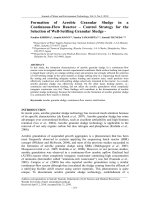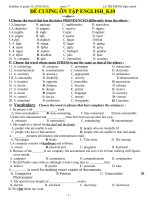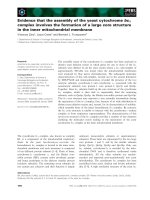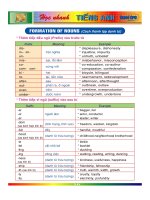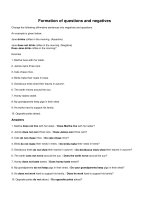Formation of questions basic rules
Bạn đang xem bản rút gọn của tài liệu. Xem và tải ngay bản đầy đủ của tài liệu tại đây (8.08 KB, 1 trang )
Formation of questions: basic rules
It is important to know how to form questions. The rules given below apply to almost all written questions and
most spoken questions.
Auxiliary verb before subject
In a question, the auxiliary verb comes before the subject. Note that if there are two auxiliary verbs, only the first
comes before the subject. Study the examples given below.
He is working in the garage. (Statement)
Is he working in the garage? (Question)
That was a silly question. (Statement)
Was that a silly question? (Question)
They have arrived. (Statement)
Have they arrived? (Question)
She has been invited. (Statement)
Has she been invited? (NOT Has been she told?)
The above sentence contains two auxiliary verbs, but we have already learned that only the first auxiliary verb
comes before the subject in a question.
She should have been more careful. (Statement)
Should she have been more careful? (Question) (NOT Should have been she more careful?)
The boys have been rewarded. (Statement)
Have the boys been rewarded? (Question)
The police have caught the thief. (Statement)
Have the police caught the thief? (Question)
Cases where there is no auxiliary verb
Affirmative sentences in the simple present and simple past tense do not have an auxiliary verb. We use do,
does or did to change them into questions.
Note that do and does are used in the present tense. Do is used with plural nouns and the pronouns I, we, they
and you. Does is used with singular nouns and the pronouns he, she and it.
Stay on top of your writing! Download our grammar guide from www.englishgrammar.org to stay up-to-date.
Powered by TCPDF (www.tcpdf.org)
